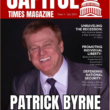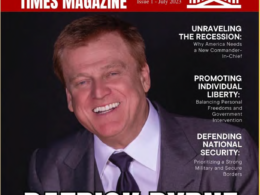The backstory on the following essay appears in “The Illustrious Henry Blodget Thinks I Am a Very Bad Man, Part 1“.
OVERSTOCK CEO PATRICK BYRNE REPLIES TO HEDGE FUND CHOAGIES: WE’RE THE GOOD GUYS, YOU’RE THE BAD GUYS
“It isn’t what we don’t know that gives us trouble, it’s what we know that ain’t so.” – Will Rogers
I have spent five years trying to expose and disrupt bad behavior on Wall Street. I conducted this campaign through public appearances and DeepCapture.com, a site of investigative journalism I fund. Those I have attempted to expose have sought to prevent public understanding of my claims by generating a mish-mash of things for the public to “know [but] that ain’t so.”
Henry Blodget has graciously invited me to respond to them here. When some years ago Henry first wrote of me he prefaced his thoughts with something along the lines of, “I’m the last guy in the world to criticize someone for what he puts in an email, but…”: that, and the present invitation to which I now respond, demonstrate to me that Henry has a sense of intellectual integrity and, it appears, humor. I thank him for his invitation, and welcome this chance to set the story straight.
I will do so in three sections: The Fight, The Result, and The Cover-Up.
THE FIGHT
My argument can be expressed in three points:
1) Participants in our capital market take for granted the settlement system running behind the scenes, but more slop exists in that settlement system than is commonly understood.
2) Stock manipulators can employ this settlement-slop when they conduct bear raids. One of their techniques is “naked short selling” There are others that are not, technically, “naked short selling” but which have essentially the same effect (e.g., failed long sales, failed offshore deliveries, abuse of the option market maker exception to create married puts or “bullets”, swaps, daisy-chaining, “bed-and-breakfasting” and perhaps other methods understood only by a handful guys who are bright lights in that lofty firmament which is Caribbean banking).
3) In August, 2005 I gave a webcast (“The Miscreants’ Ball”) where I discussed the pattern of modern bear raids. The pattern I described included such elements as:
a) a group of hedge funds which seemed to be on the scene wherever stock manipulation occurred;
b) some putatively independent analysts and journalists who seemed to be shilling for those hedge funds;
c) an “independent” research shop named Gradient who was writing hatchet-jobs on cues given by hedge funds like Rocker Partners (I made public affidavits from three ex-Gradient employees attesting to this and to reporter Herb Greenberg’s participation in the scheme);
d) Milberg Weiss, a class-action law firm which filed lawsuits in coordination with these bear raids;
e) Jim Cramer, the man in whom the stock manipulators and journalists seemed to intersect;
f) Eliot Spitzer, a New York Attorney General with problematic ties to this group;
g) and the SEC, whom I accused of not protecting the public due to having grown inappropriately close to powerful Wall Street interests.
In closing, I suggested that this network centered on someone I referred to as “the Sith Lord”. In interviews that followed I explained this by repeating a specific formulation: “I really think in terms of a composite of two people. Someday I might sack up and let the world know who the master minds are, but not now” (a hint broad enough for Wall Street to understand, I assumed).
Note that while the Miscreants’ Ball was occasioned by a lawsuit Overstock.com had filed, little of it (less than ¼) actually concerned Overstock. The remaining ¾ of the webcast mapped this pattern of bear raids in our markets.
I followed up on the Miscreants’ Ball with a three year campaign expounding on the possibility that these manipulative techniques were creating a settlement residue which degraded corporate voting, destroyed firms, and might be destabilizing the financial system.
THE RESULT
Since that day in 2005:
1) Milberg Weiss imploded under DOJ indictment, and its leaders were jailed, for using “paid plaintiffs” (i.e., shills). The indictment has a remarkable line (pages 29-30) to which no journalist has turned attention: “Unlike the other class members in the Lawsuits, the Paid Plaintiffs purchased the securities at issue anticipating that the securities would decline in value, in order to position themselves to be named plaintiffs in securities fraud class actions and to obtain kickback payments from MILBERG WEISS, BERSHAD, SCHULMAN, and others.” No journalist has yet asked, How did Milberg Weiss know which securities to direct its “Paid Plaintiffs” to purchase, and why were they “anticipating that [those] securities would decline in value”? Are Lerach and Weiss stock pickers?
2) Jim Cramer appeared in a video recounting how his hedge fund engaged in practices that he described as illegal but common, practices that were precisely what I had alleged (Cramer’s lawyers had managed to get that video removed from every spot on the Internet except DeepCapture, and I am proud it played a role in Jim’s undoing at the hands of Jon Stewart);
3) Eliot Spitzer suffered his well-known comeuppance with Ashley Dupre (no disrespect to these fine ladies intended). Less discussed is the fact that Ashlee turned out to be living rent-free in the home of Jim Chanos, a hedge fund manager who was both one of Spitzer’s earliest and largest supporters, and a key member of the network of hedge funds I had been spotlighting. So far the press corps has accepted that as coincidence, apparently assuming that one day Eliot Spitzer just picked up the Yellow Pages and called a cat-house. The possibility that hedge funds may have been involved in the procuring of Ashlee or her colleagues, and thus enjoyed joint ownership of the Attorney General of the State of New York, is something that to my knowledge only one national publication is pursuing.
4) In late 2008, Gradient settled with Overstock, issuing apology for and retraction of their scurrilous claims (sums paid, if any, have not been disclosed). In late 2009, Rocker Partners paid Overstock $5 million to settle for its part in the scheme (without admitting said scheme’s existence, to be fair).
5) Much correspondence among hedge funds, journalists, analysts, hired thugs, and Mafiosi has gotten public (some in essays published on DeepCapture, some in actions taken by the feds), and it reveals precisely the relationships which I had posited in that call.
6) Bloomberg Magazine published “The Corporate Voting Charade”, an investigative piece by Bob Drummond, describing how slop in our settlement system makes corporate elections a “sham”. As Drummond wrote, “the results of high-stakes company decisions may hinge on the invisible influence of millions of votes that shouldn’t be counted, says Thomas Montrone, chief executive officer of Cranford, New Jersey–based Registrar & Transfer Co., which oversees shareholder elections. ‘It is an abomination,’ Montrone, 58, says. ‘A lot of the time we have no idea who’s entitled to vote and who isn’t. It’s nothing short of criminal.’” Drummond proceeds, “There are votes cast twice on almost every matter of substance,” Hagberg, 63, says. “It definitely can and does, in my experience, affect the outcome of corporate elections and proposals.”
7) By 2008 numerous journalists were covering how companies were destabilized by these techniques of settlement-system gaming. Bloomberg TV did a half hour Special Report, “Phantom Shares”, that was nominated for an Emmy – Long Form Investigative Journalism.
8) In 2008’s systemic crisis settlement-gaming was repeatedly implicated:
a) Two Wall Street firms which had been saying the crime of naked short selling didn’t exist went under screaming it had been their undoing;
b) The SEC implemented an unprecedented emergency order to protect our financial system from the crime they had been saying didn’t exist;
c) In autumn, 2008 regulators from the G-20 held emergency meetings directed towards keeping the financial system from Chernobylling from this non-existent crime;
d) Also in autumn, 2008, the SEC finally closed some of the settlement loopholes that enabled the crime that didn’t exist, and several hedge funds (including Rocker Partners) imploded when the loopholes they weren’t using were suddenly closed.
9) In December, 2008, Bernie Madoff turned himself in, and everyone from 60 Minutes to the United States Congress learned about “regulatory capture” and the SEC under George Bush;
10) As I write, feds seem to be rolling up a network of hedge fund players, and press reports put at the center of that network one Steven A. Cohen, or “SAC” as his fund is called (while the hedge fund community reduces its ties to SAC, Reuters recently killed a story on Cohen, at his request).
So may we agree that the DeepCapture Team turned out to be at least directionally correct?
The Cover-Up
When I started my campaign I was curious to discover how far extended the intellectual corruption of the New York financial press. I mapped it with sonar-pings, and in time became convinced that, with some exceptions (notably, several Bloomberg journalists, Fox Business, and a few islands of reporters isolated here and there) the bulk of the New York financial press lack a faculty for critical thought and the courage to take a position contrary to a well-accepted truth, and a few are actually hostile to truth. If I were still teaching, I would say that most performed like Continental Philosophy hysterics forced to take an econ class. Their conformity and indolence permitted a cover-up to persist.
1) Their list of Wash-Rinse-Repeat instructions was short:
a) Do not report what Byrne is saying about bear raids; pretend he is just talking about Overstock.
b) Do not report what Byrne says about naked short selling; pretend he is talking about Overstock.
c) Pretend not to understand the “Sith Lord” reference. It’s a metaphor. Say: “Who uses metaphors? That’s crazy, right?”
d) Prime directive – Do not feed the “bear raids” meme. Bear raids do not exist.
2) The social media cover-up: DeepCapture.com ‘s investigative journalist/technologist Judd Bagley acquired a computer filled with emails that confirmed the relationships among hedge funds and law firm cut-outs, convicted stock manipulators, message board posters and Wikipedia sock-puppets that all sane observers already saw. This network conducted the following activities:
a) Two million pages on Wikipedia run by one set of rules. The page on Naked Short Selling runs by a different set of rules. In what became the largest internal scandal in Wikipedia’s history, it turned out that a down-and-out journalist named Gary Weiss had been given control of this page by the Wikipedia higher-ups. In fact, Weiss ultimately made a mistake that revealed he was manipulating social media from within the DTCC, the Fort Knox-like corporation at the heart of the settlement system, as Judd Bagley uncovered. What followed was an enormous Wikipedia civil war in which, ultimately, the Wikipedia community caught Gary Weiss red-handed. The Register, a British on-line publication focusing on Silicon Valley, covered this story extensively. Their first stories were skeptical, but as a staggering amount of evidence accumulated in support of them, they shifted sides and confirmed what we had been claiming: “reporter” Gary Weiss was part of a remarkable campaign to manipulate social media to cover up financial crime.
b) We and our sympathizers were frequently threatened. One journalist who took our side was jumped, beaten up, and told to stay away from this story. One fellow traveler, Dave Patch, saw his and his wife’s names, addresses, and social security numbers posted at an online message board. Mary Helburn (another fellow traveler) saw someone using as aliases the names of her nephew (a head-injury-survivor) and deceased sister to post nasty and vaguely-threatening messages. Judd Bagley, an investigative journalist who works for DeepCapture, saw the names, ages and home address of his two young daughters posted online by Sam Antar (naturally, shortly thereafter Sam became a favored presense for Fortune Magazine and CNBC). None in the press would report on any of this. However, in a display of selective outrage which demonstrates the low intellectual integrity of which I write, when Judd recently documented and questioned the appropriateness of the fact that the hedge fund folk and the journalists of whom we write are Facebook Friends with each other (which one would not see, for example, among political reporters and the politicians they cover), that was written about as though it were an incredibly intrusive thing for Judd to do, even though the material he assembled was already self-published on Facebook by those later claiming it was intrusive of Judd to gather and display. Interestingly, in their stories criticizing Judd most choagies went far out of their way to bury mention of DeepCapture (some did not even mention it at all, though that is where Judd’s work appeared). Instead, “Overstock” was substituted for “DeepCapture.com”, my name for Judd’s (at least in titles), they claimed it was “hacking” when no hacking occurred (they’re just technologically illiterate), and they write of lists of “Overstock’s enemies and critics” when, in fact, this and most of what Judd writes nothing to do with Overstock. This song isn’t about me: it’s about the extraordinary deference show by the financial press to some bear raid-conducting hedge funds. But that is the meme that must be suppressed.
A year ago DeepCapture was voted the Internet’s Best Business Blog, and recently, named best for Business Investigative Journalism. The Wall Street Journal graciously listed mine as among the “Best Calls of 2008”, and CNBC talking heads recently acknowledged we turned out to be right all along. Ye the CNBC/Fortune/New York Times crowd, who once leapt on obscure issues related to me (Herb Greenberg wrote a story the thesis of which was that sometimes I answered emails quickly, but sometimes slowly), went mute as soon as we launched DeepCapture. I believe they realized from that point forward reporting on my allegations would require mentioning DeepCapture, which would make it too easy for the public to investigate. They thus suddenly ceased coverage altogether, or only engaged in circumlocution-filled slurs. When DeepCapture blossomed the choagies lost control of the narrative, so their best hope became to avoid its mention.
So Henry, that is my rebuttal to the choagies: We were right and their outrage about Judd is as selective as their cover-up was transparent. Their Roar of Criticism became a Cloak of Silence the day DeepCapture launched, which tells the objective readers all she needs to know.
I look forward to meeting someday, Henry, and until then, I remain,
Yours in good humor,
Patrick M. Byrne
And so ends the story of recent “nastiness” with the Illustrious Henry Blodget. And I must say, it is good to see how much personal growth he has achieved since his days at Merrill Lynch.









Here Here Doc@@@@@
No one takes ol ‘enry serious anyway
Very nice of you to give Henry Blodget the benefit of the doubt Dr. Byrne. Alas I suppose old Hank’s true persona was revealed to all years ago. People have the ability to change if they want to, but they usually don’t. Blodget is just another incarnation of the tired old stereotypical snake oil salesman. Banned from selling snake oil, he’s found new ways to prostitute himself.
Here’s a bit from Henry’s past he’d rather not talk about:
http://www.lawyershop.com/practice-areas/criminal-law/white-collar-crimes/securities-fraud/lawsuits/merrill-lynch/
Henry Blodget is a cold, calculating Wall Street insider and is not to be trusted. After reading this post, it seems extremely likely that the noted differences in indemnification verbiage was designed, quite simply, to set a trap for you Dr. Byrne. I’m glad you’re careful. Is this little bit of mischief very different from the chicanery that was the norm at Merrill ?
A pox on you Henry Blodget.
Harveywall —
No, that was not a trap, unless Blodget is stupid as well as a jerk. It was his cover because he never intended to publish Patrick’s stuff and he knew Patrick would never sign.
Forgive me but what is the point of Blodget’s grand machinations then … If only to pull the football out at the last moment before Charlie Brown is able to kick it ? Seems a fair amount of finagling was pit into this. Blodget must have had an angle to make it worth his while. Otherwise, what’s the point ? Seems like alot of trouble to carry on if only to facilitate a snub.
More likely is that perhaps Blodget’s legal representation is comprised of D-for-diploma students… I suppose stranger things have happened.
Most likely IMHO is that it was an attempt at a set up; a feeble attempt but hostile nonetheless.
In case there is interest, you may find it interesting that a comment with this link:
https://www.deepcapture.com/wp-content/uploads/2009/10/story-of-dendreon.pdf
… gets automatically moderated on:
http://www.businessinsider.com/jim-chanos-china-is-overheating-and-overindulging-2010-2
… as well as on:
http://www.ritholtz.com/blog/2010/02/chanos-sees-overheating-and-overindulgence-in-china/
I was commenting on those, wondering if it was the very same chanos. I’m assuming it is…
Where’s the Bunny?!?
Bob O’?
Sunshine beats these guys. The truth can’t be held back.
Banners, t-shirts, emails to your friends who email their friends, etc., the cockroaches scurry when they are exposed as they need to hide under a rock and if we remove the rocks, they will lose every time.
I write “https://www.deepcapture.com” on my money (an IOU from the privately owned Federal Reserve, that’s why it says “Federal Reserve Note” on it, which means it is an IOU from them to you), which I think is funny on so many levels, but if even one person follows my link, then writes the same URL on their money, then we have them.
Well done! I do wish that you would spend more time looking at my contention that much of the shenanigans in question are “state sponsored” industrial chicanery.
Why not have an uptick rule to to prevent bubbles from being created? Why must all stocks go up, always? Why must all commodities go down, always?
If your company was profitable and well run then you could crush any bear raid (see VW). Bear raids (cash equity) tend to pick off the weak among the flock and even then hardly result in catastrophe for the company (save the management with vested stock options who should learn how to run a better “show”)
Show me a company where a bear raid (cash equity) has resulted in firm failure. Show me a firm that went bankrupt that did not deserve to, due to a cash equity bear raid. These “raids” are temporary and if the firm has any real value it will rip open the bears. Its that simple.
The real problem is CDS and their impact on credit – not equity prices. If you really need to flap your arms and spew hot air about a topic that may, MAY, have a positive impact, look into that realm.
Otherwise, STFU and run your company efficiently and profitably – do this and you will never have to worry about equity bear raids.
“I would say that most performed like Continental Philosophy hysterics forced to take an econ class”
Don´t blame it on Continental Philosophy…
Blame it on the kind of economics that gets taught at most universities.
Vying for bottom-rung with journalists in this business are the economists..
Nietzsche comes out of this quite well…
Lila
BCIT CO.Highjacked by SEC Big bucks here